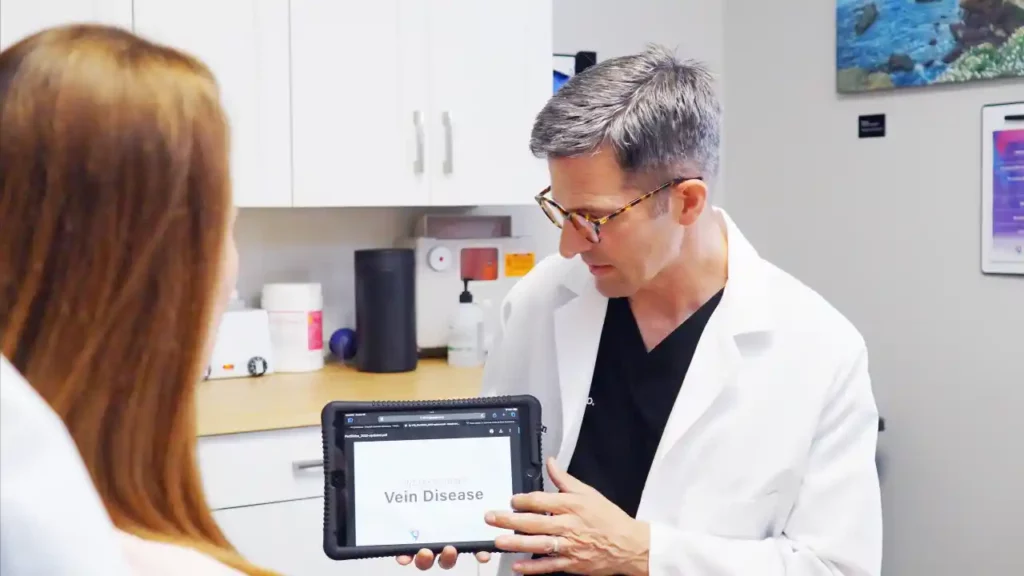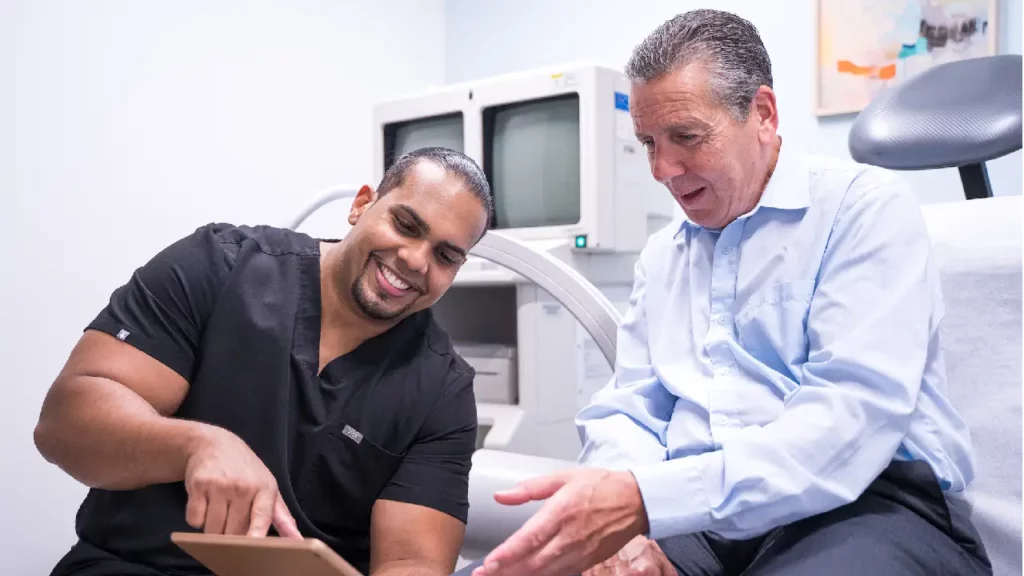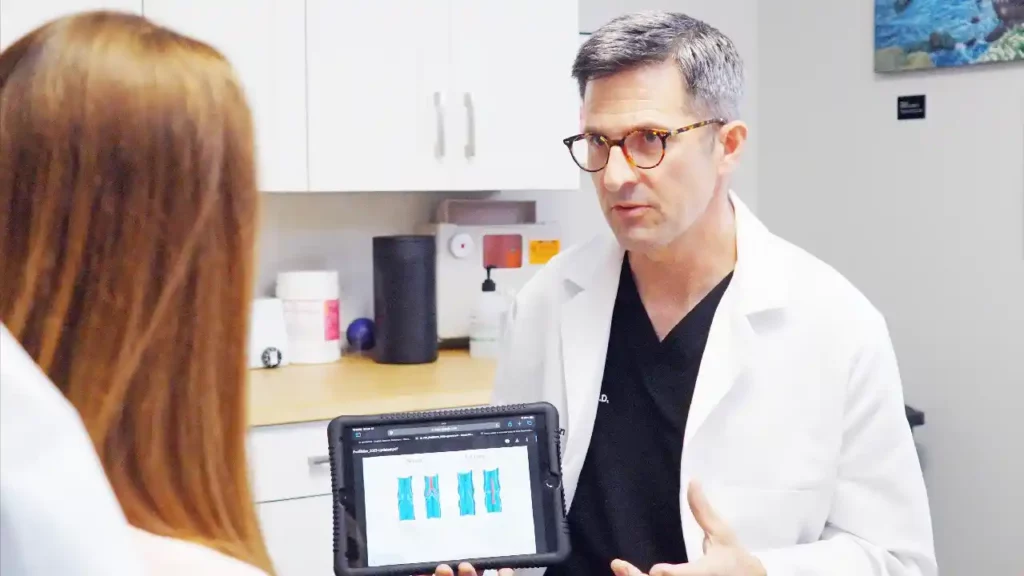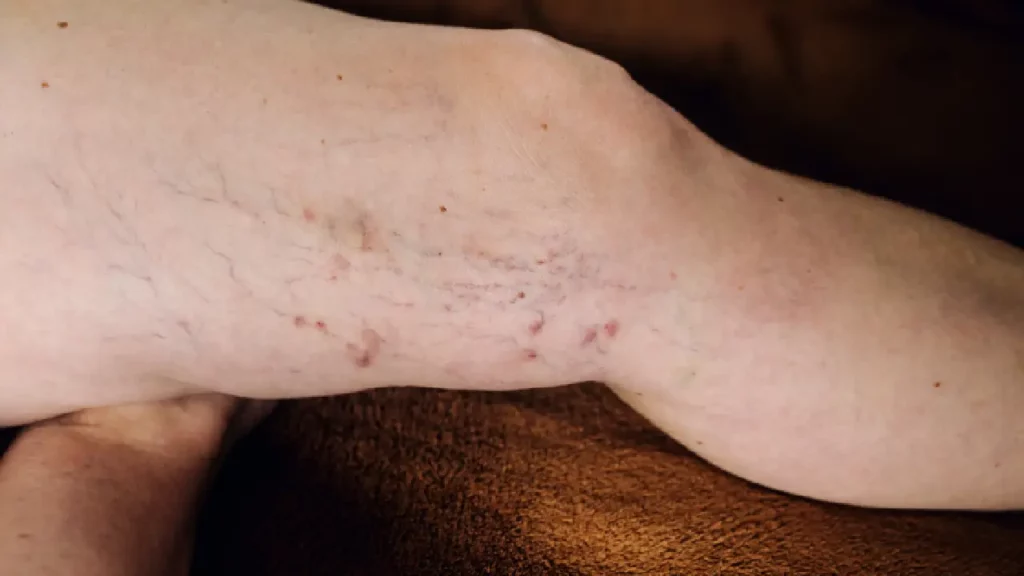When it comes to vein issues, many people assume that surgery is the only viable solution. That may have been true a few decades ago, but that’s no longer true. Thanks to recent medical innovations, spider veins and varicose veins can be treated using simple, in-office, minimally invasive vein treatments like sclerotherapy, endovenous ablation, and VenaSeal. These non-surgical vein treatment options are effective, less invasive, and come with minimal downtime.
At Vein Doctor for Women, our board-certified vein doctors are dedicated to offering you the best in vein care tailored to your specific needs. In this article, we explore various non-surgical vein treatment options that we offer to help you achieve healthier, more beautiful legs.
Sclerotherapy
Sclerotherapy is a popular and highly effective non-surgical vein treatment option. It involves injecting a solution directly into the affected veins, causing them to collapse and eventually be absorbed by the body. This treatment is commonly used for both varicose and spider veins. During the procedure, a sclerosing agent is injected into the vein. This solution irritates the lining of the blood vessel, causing it to swell, stick together, and eventually close off. Over time, the vein turns into scar tissue and fades from view.
Benefits of Sclerotherapy:
- The procedure involves only small injections and does not require anesthesia.
- Most patients can return to their normal activities immediately after the treatment.
- Many patients experience significant improvement after just one session.
Foam Sclerotherapy
Foam sclerotherapy is a variation of traditional sclerotherapy. It uses a foamed sclerosing agent, which is more effective for treating larger varicose veins. The foamed solution is injected into the vein, where it displaces blood and allows for better contact with the vein walls. This enhances the effectiveness of the treatment, especially for larger veins.
Benefits of Foam Sclerotherapy:
- The foam provides better coverage and contact with the vein walls.
- Similar to traditional sclerotherapy, involving small injections.
- Patients can usually return to normal activities right after the procedure.

Endovenous Laser Therapy (EVLT)
Endovenous Laser Therapy (EVLT) is a minimally invasive procedure that uses laser energy to treat varicose veins. This method is especially effective for larger varicose veins that may not respond well to other treatments. During EVLT, a thin laser fiber is inserted into the affected vein through a small incision. The laser energy heats the vein walls, causing them to collapse and seal shut. The body then naturally reroutes blood flow to healthier veins.
Benefits of EVLT:
- Requires only a small incision and local anesthesia.
- Typically completed in less than an hour.
- Provides long-lasting relief from varicose vein symptoms.
Radiofrequency Ablation (RFA)
Radiofrequency Ablation (RFA) is another advanced non-surgical treatment for varicose veins. It uses radiofrequency energy to heat and close off problematic veins. Similar to EVLT, RFA involves inserting a catheter into the affected vein. Radiofrequency energy is then delivered through the catheter, heating the vein wall and causing it to collapse and seal shut.
Benefits of RFA:
- Performed with local anesthesia and a small incision.
- Patients often experience minimal discomfort during the procedure.
- RFA has a high success rate and provides significant symptom relief.
VenaSeal
VenaSeal is a cutting-edge, non-surgical vein treatment that uses a medical adhesive to close off varicose veins. This method is unique because it does not require heat or anesthesia. During the procedure, a special adhesive is delivered into the vein through a catheter. The adhesive seals the vein, and the body naturally reroutes blood to healthier veins.
Benefits of VenaSeal:
- The procedure is painless and does not require local anesthesia.
- Typically completed in less than an hour with minimal downtime.
- Provides immediate vein closure and relief from symptoms.
Ambulatory Phlebectomy
Ambulatory phlebectomy is a minimally invasive procedure for removing varicose veins close to the skin’s surface. It involves making tiny incisions to extract the veins. Under local anesthesia, small incisions are made along the vein. Using a special tool, the vein is gently removed through these incisions. The process is relatively quick and leaves minimal scarring.
Benefits of Ambulatory Phlebectomy:
- Involves small incisions and local anesthesia.
- The vein is physically removed, providing instant cosmetic improvement.
- Patients can resume normal activities shortly after the procedure.
ClariVein
ClariVein is a non-surgical vein treatment that combines mechanical and chemical methods to treat varicose veins. This innovative approach uses a rotating catheter to deliver a sclerosant, which closes the vein. A catheter with a rotating tip is inserted into the vein. As the catheter rotates, it creates mechanical damage to the vein wall while simultaneously delivering a sclerosant solution. This combination leads to the vein’s closure.
Benefits of ClariVein:
- Requires only a small puncture site and no anesthesia.
- The procedure is quick and can be completed in a single session.
- Provides immediate vein closure and symptom relief.
Compression Stockings
Compression stockings are specially designed hosiery that apply gentle pressure to your legs, helping to improve blood flow and reduce symptoms associated with varicose veins and other venous conditions. These stockings provide graduated compression, which means they are tighter at the ankle and gradually become less constrictive up the leg. This helps to promote blood flow back to the heart and reduce swelling and discomfort.
Benefits of Compression Stockings:
- It is simple to use and does not require a procedure.
- Can significantly reduce symptoms such as swelling, aching, and heaviness in the legs.
- Helps prevent the progression of varicose veins and other venous conditions.

Lifestyle Changes to Improve Vein Health
While non-surgical treatments are effective in addressing existing vein issues, adopting certain lifestyle changes can significantly improve your vein health and help prevent future problems. At Vein Doctor for Women, we believe in a holistic approach to vein care, which includes not only treatments but also lifestyle modifications that can support your overall vascular health. Here are some key lifestyle changes you can make to improve your vein health:
- Exercise Regularly: Engage in activities like walking, swimming, and cycling to improve blood circulation and strengthen your veins.
- Maintain a Healthy Weight: Excess weight can put additional pressure on your veins, so aim for a balanced diet and regular physical activity to achieve and maintain a healthy weight.
- Elevate Your Legs: Elevate your legs above heart level several times a day to reduce swelling and improve blood flow.
- Avoid Prolonged Sitting or Standing: If your job requires long periods of sitting or standing, take breaks to move around. This helps prevent blood from pooling in your legs.
- Stay Hydrated: Drink plenty of water to keep your blood thin and flowing smoothly.
- Avoid High Heels and Tight Clothing: High heels can restrict calf muscle function, and tight clothing can impede blood flow. Opt for comfortable shoes and loose-fitting clothes.
- Practice Good Posture: Maintaining good posture helps prevent pressure on your veins and encourages better circulation.
Choosing the Right Non-Surgical Vein Treatment
Selecting the appropriate non-surgical vein treatment depends on various factors, including the severity of your vein condition, your medical history, and your personal preferences. At Vein Doctor for Women, we are committed to providing personalized care and will work closely with you to determine the best treatment plan:
- Initial Consultation: During your initial consultation, our vein doctors will conduct a thorough examination and review your medical history. We may use ultrasound imaging to assess the condition of your veins and determine the underlying cause of your symptoms.
- Customized Treatment Plan: Based on the findings, we will develop a customized treatment plan tailored to your specific needs. We will discuss the various non-surgical vein treatment options available and help you understand the benefits and potential risks of each.
- Follow-Up Care: After your treatment, follow-up appointments are crucial to monitor your progress and ensure optimal results. Our team will provide you with detailed aftercare instructions and support you throughout your recovery journey.
Explore Your Non-Surgical Vein Treatment Options With Vein Doctor for Women
Non-surgical vein treatment options offer effective solutions for managing vein issues without the need for invasive surgery. At Vein Doctor for Women, we pride ourselves on providing the highest quality care and the latest treatment options to help you achieve healthier, more beautiful legs. Whether you’re dealing with varicose veins, spider veins, or other venous insufficiencies, we are here to guide you every step of the way. Schedule your consultation to explore your non-surgical vein treatment options with a vein doctor.
